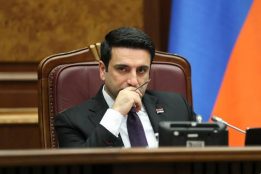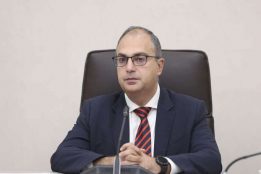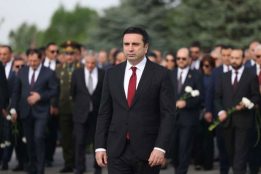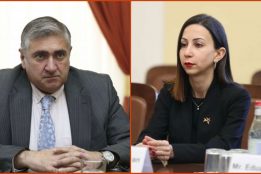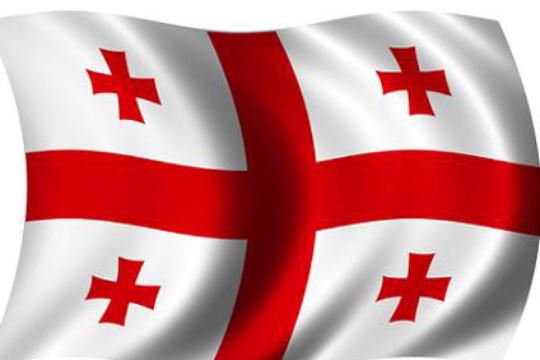
EURASIANET published Molly Corso’s recent article on Georgia, where the journalist questions whether the democratization is possible without the rule-of law.
Molly Corso is a freelance journalist who also works as editor of Investor.ge, a monthly publication by the American Chamber of Commerce in Georgia.
Read the full article below:
Can there be democratization without the rule-of-law? Georgia is an interesting case in this regard.
The country reached significant democratization milestones in 2012. Most recently, the watchdog group Transparency International praised Georgia for being the only country in the Caucasus and Central Asia regions to make significant progress in tackling corruption. And in October, of course, Georgia drew plaudits from Western capitals for the conduct of parliamentary elections, and the subsequent political transition.
Yet, even as Georgia has made strides in some areas, the rule-of-law issue has remained stubbornly problematic. Especially since the violent confrontation with opposition protesters in Tbilisi in November 2007, President Mikheil Saakashvili’s administration has faced a steady stream of criticism about arbitrary actions and an opaque decision-making style.
The electoral blowout suffered by the Saakashvili-led United National Movement (UNM) in the October elections seemed to offer an opportunity to bring the rule-of-law issue into line with other aspects of Georgia’s democratization process.
But the early indicators suggest that Prime Minister Bidzina Ivanishvili’s government is continuing arbitrary practices, rather than rectifying problems. As the list of former Georgian state officials targeted by prosecutors grows longer by the day, questions are being asked about the Ivanishvili’s government understanding of the concept of rule of law. The answer will certainly influence Georgia’s chances for membership in both the North Atlantic Treaty Organization and the European Union.
At the heart of the rule-of-law issue is the matter of judicial independence. During the National Movement’s tenure in power, both international and Georgian critics routinely derided the court system for its subservience to the government’s will; criminal convictions accordingly often relied on scanty evidence.
Can Ivanishvili’s government rise above that legacy? Civil society activists and political scientists believe that, despite Georgia’s much-hailed democratic-reform drive, the answer to how the country’s new leaders understands rule of law still lies in the future.
For now, Georgian society tends to conflate rule of law with the political agenda of incumbent authorities, noted human-rights lawyer Nazi Janezashvili, the executive director of Article 42 of the Constitution, a non-governmental civil-rights advocacy group. [Article 42 receives funding from entities connected to the Soros foundations network. EurasiaNet operates under the auspices of the Open Society Foundations in New York, which is also part of the Soros network].
Confusion, Janezashvili argued, extends to judges themselves, who are appointed by the president. With a judicial system that is not “transparent and independent,” little chance exists for correcting that misunderstanding, she added. “If we have a problem with the justice system, if we have a problem with judges and their understanding of the rule of law, how can we say that society has an appropriate understanding of the rule of law?”
Foreign donors have long encouraged the rule of law in Georgia. In 2012, the US Agency for International Development spent 38 percent of its country budget, or $19.9 million, on democracy and governance programs which addressed the topic. But how far those funds have gone toward trying to adjust rule-of-law misperceptions remains unclear.
The Soviet legacy encouraged the perception that justice in Georgia is a political tool, and that courts can be used as an instrument for revenge, observers say. For many, that perception was reinforced by the UNM government’s prosecutions back in 2007 of opposition leaders and activists on charges ranging from planned coups to espionage for Russia.
Given that history, many Georgians just shrug at what’s occurring to UNM leaders today. What Saakashvili allies term “persecution,” many Georgians see as payback, while some even applaud the detentions of 21 pro-Saakashvili former officials.
Among many grassroots Georgian-Dream supporters, as evidenced by their ongoing calls for Saakashvili’s resignation, the “desire for revenge” has been “sort of combined” with “a desire for justice,” commented Timothy Blauvelt, an associate professor of Soviet and Post-Soviet Studies at Ilia State University in Tbilisi.
The expectation of revenge can be traced to the wholesale political housecleanings of the past, Blauvelt continued. “The way that everything has always happened before is that political change happens in complete removal of the previous and bringing in of the new,” he said.
The combined desires for justice and revenge may also run strong among government officials. Ministers condemning Saakashvili allies before they go on trial, or, in some cases, before they are arrested underline the lack of understanding about due process, Janezashvili said. Complaints appear to prompt arrests, in some cases.
“Everyone knows that some people committed some crimes … but everything should be investigated by the prosecutor’s office, not by the people, or high officials,” Janezashvili said. “Society does not understand the importance of such procedures.”
The government, for its part, has dismissed all criticism that its arrests and investigations are motivated by a political desire for retribution.
Justice Minister Tea Tsulukiani has already laid out some plans to reform the judicial system, including changes to the criminal code and a reorganization of the High Council of Justice, the body that oversees the Georgian court system. Judges, she has said, will not be fired.
Charges have also been dropped or prosecutions halted against nearly 30 people for lack of evidence.
The political challenge for the Ivanishvili government is to somehow bring implicated former officials to justice without being seen as vindictive. The failure to do so will just further erode faith in the system, commented political scientist Marina Muskhelishvili. “The only way to take a step to the future and to leave everything in the past is to investigate, first of all and, to some extent, punish,” Muskhelishvili said.

















